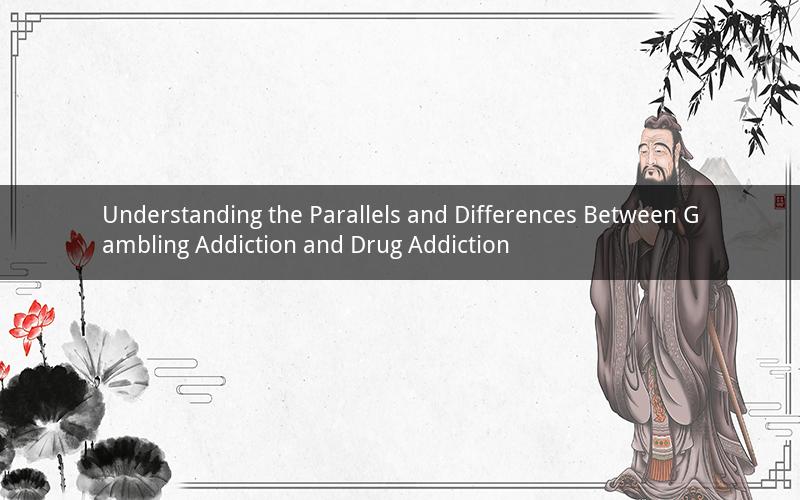
Introduction:
Gambling addiction and drug addiction are two of the most prevalent forms of addictive behaviors. While both involve the compulsive pursuit of a substance or activity, there are distinct similarities and differences between the two. This article explores the similarities and differences between gambling addiction and drug addiction, shedding light on their underlying causes, consequences, and treatment approaches.
Similarities:
1. Compulsive Behavior:
Both gambling addiction and drug addiction are characterized by compulsive behavior. Individuals with gambling addiction are driven by an irresistible urge to gamble, often leading to excessive and uncontrollable spending of time and money. Similarly, individuals with drug addiction are compelled to use drugs, despite negative consequences and the potential for harm.
2. Loss of Control:
Both gambling addiction and drug addiction involve a loss of control over the behavior. Individuals with gambling addiction find it difficult to stop gambling, even when they want to. Similarly, individuals with drug addiction struggle to control their drug use, often relapsing despite efforts to quit.
3. Negative Consequences:
Both gambling addiction and drug addiction have significant negative consequences on individuals' lives. These consequences can include financial difficulties, strained relationships, legal problems, and health issues. The destructive nature of both addictions can lead to a downward spiral, affecting various aspects of an individual's well-being.
4. Psychological Factors:
Both gambling addiction and drug addiction are influenced by psychological factors. Individuals with gambling addiction may seek the thrill and excitement that gambling provides, while those with drug addiction may seek relief from emotional pain or stress. These psychological factors contribute to the development and persistence of addictive behaviors.
Differences:
1. Nature of the Stimulus:
The primary difference between gambling addiction and drug addiction lies in the nature of the stimulus. Gambling addiction involves the pursuit of monetary gains and the thrill of winning, while drug addiction involves the consumption of substances that alter the brain's chemistry and produce euphoric effects.
2. Physical Dependence:
Drug addiction often leads to physical dependence, where the body becomes reliant on the substance to function normally. This physical dependence can manifest as withdrawal symptoms when the substance is stopped. In contrast, gambling addiction does not typically result in physical dependence, although it can lead to psychological withdrawal symptoms when gambling is restricted.
3. Treatment Approaches:
The treatment approaches for gambling addiction and drug addiction may differ. Treatment for drug addiction often involves medication-assisted therapy, detoxification, and counseling. On the other hand, treatment for gambling addiction may focus more on cognitive-behavioral therapy, self-help groups, and financial management strategies.
4. Social Impact:
The social impact of gambling addiction and drug addiction can vary. Drug addiction may have a more immediate and visible impact on an individual's appearance and behavior, whereas gambling addiction may be more discreet, making it harder for others to recognize the problem.
5. Legal and Ethical Considerations:
Gambling addiction and drug addiction also differ in terms of legal and ethical considerations. Drug addiction is illegal in many countries and is often associated with criminal activities. In contrast, gambling addiction is legal in most places, although it can still lead to legal issues if individuals engage in illegal gambling or steal to fund their addiction.
Questions and Answers:
1. Q: Can someone be addicted to both gambling and drugs?
A: Yes, it is possible for an individual to be addicted to both gambling and drugs. Co-occurring disorders are common, and individuals may struggle with multiple forms of addiction simultaneously.
2. Q: Is there a genetic component to both gambling addiction and drug addiction?
A: Yes, there is evidence to suggest that both gambling addiction and drug addiction have a genetic component. Research indicates that certain genetic factors can predispose individuals to addictive behaviors.
3. Q: Can someone overcome gambling addiction or drug addiction without professional help?
A: While it is possible for individuals to overcome addiction without professional help, it is often more challenging. Professional treatment and support can provide individuals with the necessary tools and resources to overcome addiction more effectively.
4. Q: Are there any medications available to treat gambling addiction?
A: Currently, there are no medications specifically designed to treat gambling addiction. However, medications used to treat other mental health conditions, such as depression or anxiety, may be helpful in managing some of the underlying factors contributing to gambling addiction.
5. Q: Can gambling addiction lead to physical health problems?
A: Yes, gambling addiction can lead to physical health problems. The stress and anxiety associated with gambling addiction can contribute to various health issues, including cardiovascular problems, sleep disturbances, and weakened immune system.
Conclusion:
Understanding the similarities and differences between gambling addiction and drug addiction is crucial in addressing and treating these complex issues. While both addictions involve compulsive behavior and negative consequences, they differ in terms of the nature of the stimulus, physical dependence, treatment approaches, social impact, and legal considerations. Recognizing these differences can help individuals seek appropriate support and treatment, leading to a greater chance of recovery.